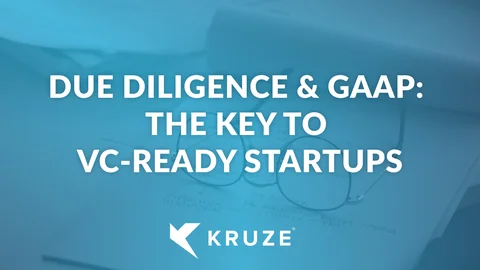
Raising venture capital is a major milestone for startups – but it can come undone quickly if your accounting is sloppy or non-compliant. Today VC due diligence is more rigorous than ever. The secret weapon for smooth diligence and investor trust? Robust accounting and GAAP-compliant financials – mostly. We’ll come back to that in a bit.
Why Good Accounting Practices Matter
From day one, startups should deploy an accounting system – not spreadsheets – to track all financial activity. Timely, accurate, and organized bookkeeping provides a real-time snapshot of your business’s health. Investors demand access to historical financials, cash flow data, and clear explanations for any anomalies. Sloppy records or gaps can derail a deal and cost valuable time and trust.
GAAP: The Gold Standard for Credibility and Comparability
Generally Accepted Accounting Principles (GAAP) are the industry benchmark for transparent, consistent, and comparable financial reporting. Investors and lenders like GAAP-compliant statements because they make metrics like revenue, burn, and gross margins reliable and easy to compare with peers. GAAP requires you to recognize revenue and expenses consistently – key for showing VCs both performance and future potential.
But there’s a catch: The cost. While “full GAAP” compliance is the theoretical gold standard, in reality most early-stage startups benefit from a practical approach: “GAAP with exceptions.” This hybrid lets founders build investor trust, streamline diligence, and avoid the unnecessary cost of perfect compliance – until it’s truly needed.
What Is “GAAP with Exceptions”?
“GAAP with exceptions” means preparing financials using accrual accounting and the core principles of Generally Accepted Accounting Principles (GAAP) – but recognizing that rigorously applying every GAAP rule is often overkill (and cost-prohibitive) for startups.
- You match revenue and expense to when they’re earned or incurred (accrual accounting), not just when cash comes in or out.
- You skip certain time-consuming or expensive requirements, such as detailed inventory tracking, complex stock option valuation models, or depreciation schedules, if they’re not material to the business.
How Does “GAAP with Exceptions” Affect Due Diligence?
Venture capitalists are sophisticated. They know most early-stage startups can’t (and shouldn’t) shell out for public company-level accounting. Instead, they want:
- Accrual basis financials for transparency and comparability.
- Key GAAP concepts applied where material – like revenue recognition, capitalized software, and basic internal controls.
- Exception notes for areas where GAAP wasn’t followed, and why. Clarity and honesty outweigh technical perfection at the startup stage.
The Benefits of GAAP with Exceptions
GAAP with Exceptions offers early-stage startups a number of advantages:
- Efficiency. Directs accounting investment where it matters (revenue, major expenses, equity) – not expensive “check the box” work.
- Investor-Ready. Meets VC expectations, providing a true view of business health and performance using accepted principles.
- Scalable. Exception areas can be addressed fully when the company is larger, selling, or required by a lead investor.
- Transparency. Exception disclosures show VCs you’re honest, detail-oriented, and ready to upgrade your processes as scale requires.
How Good Accounting Accelerates Due Diligence
Good accounting practices allow investors to quickly verify key metrics and assess the health of your startup, which helps reduce delays during diligence. Other advantages include:
- Investor Confidence. VCs want proven internal controls and audit-ready records.
- Audit Trail. Clear records make audits and reviews faster and easier, reducing the risk of post-term sheet surprises.
- Speed to Funding. The more organized and professional your accounting, the faster you’ll clear diligence and close your round.
- Ongoing Compliance. Many venture deals require regular financial reporting post-close. Starting early prevents expensive catch-up work when scaling or going public.
Kruze Consulting’s Advice
Implement cloud-based, GAAP-compliant accounting software and work with a dedicated startup accounting expert. Don’t wait until you are raising money to implement good accounting practices – getting your financial house in order early makes fundraising easier, boosts valuation, and positions your company for long-term success. Ready to prepare for your next round? Talk to Kruze Consulting’s experts today.



